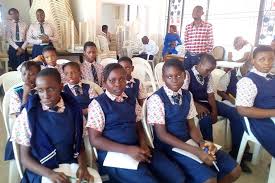Malala Fund, a Non-Governmental Organization (NGO), in a new report on girls education in the country amidst the COVID-19 pandemic, says girls in Nigeria faced distinct gender impact from the COVID-19 pandemic with over 50 percent of them not receiving any help to continue their education during school closures.
Ms Crystal Ikanih-Musa, Country Representative, Malala Fund, told a news conference in Abuja on Friday that the Fund had launched the report on girls’ education and COVID-19 in Nigeria, saying that before the pandemic, an estimated 13.2 million children were out of school and the federal government should, as a priority, ensure safe and gender-responsive school re-opening to ensure the return of out of school girls.
She said school closures forced millions of students out of school, adding that the COVID-19 pandemic also heightened the crisis facing girls’ education in Nigeria, such that “if leaders don’t act now, we risk losing another generation of girls”.
“The report, which analyzed survey data collected from 2,253 respondents in Kaduna state, documents a widening gap for girls’ learning access during the COVID-19 lockdown. Girls surveyed in Kaduna state experienced less access to learning resources, suffered increased domestic burdens and lacked academic support from their families. The report states that the government’s distance learning programme did not reach all students. Just 10 per cent of girls and 24 per cent of boys accessed distance learning offered via television and 18 per cent of children used radio for study, while two per cent used mobile phones. The data provides a sample data set glaringly showing educational disparities across Nigeria during the lockdown”.
According to the report, the data also showed that while mothers supported their children almost equally, fathers were 36 percent more likely to assist their sons’ learning than their daughters.
The report also showed that in general, boys were twice more likely to have access to a private tutor during the pandemic, than girls.
On the economic impact of COVID-19 on families and girls’ education, the report showed that over 80 per cent of adults faced financial difficulties amid insufficient government guidance on how to ensure that girls in the lower socio-economic and conflict –affected states would re-enroll in school after the pandemic.
Mr Hamzat Lawal, Chief Executive Officer of Connected Development (CODE), a partner to the Malala Fund, said that with the reopening of schools there was need for governments at all levels to ensure safe, gender responsive re-opening plans.
Lawal said the report also counseled the government to provide gender-equitable and inclusive distance learning, to support all students through current and future school closures, in addition to the need to mitigate the economic effects of the COVID-19 crisis to enable families to prioritize education.
He also cited the report as urging governments at all levels to protect the progress of girls’ education and rebuild the education system with gender at the centre so as to promote inclusive growth and ensure that every girl could learn.
The Malala Fund is committed to working for a world where all girls can learn and lead, advocating for resources and policy changes needed to give all girls education .In Nigeria, the Fund advocates for education for the girl child in six states in the North.

